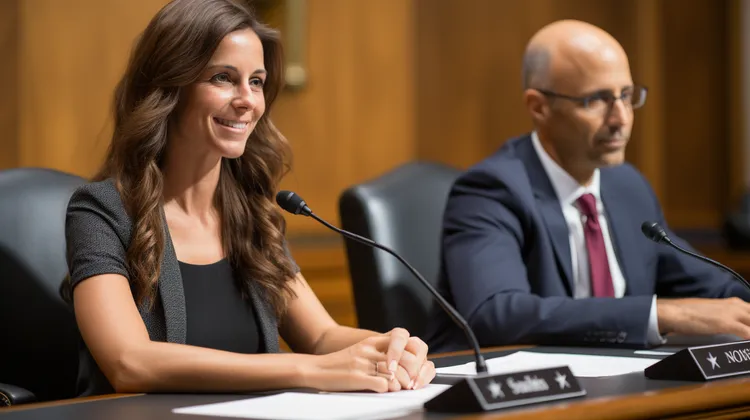
Cathie Wood Suggests Gensler’s Politics Influence BTC ETF Decision
In the fast-evolving landscape of cryptocurrency regulation, the stance of the United States Securities and Exchange Commission (SEC) remains a heavily scrutinized topic. With the emerging popularity of Bitcoin (BTC) and other digital assets, investors and enthusiasts have been calling for the approval of a Bitcoin Exchange-Traded Fund (ETF) that holds actual (“spot”) BTC. The SEC, now under the leadership of Gary Gensler, has consistently delayed and denied applications for such financial products, leaving market participants in limbo.
Cathie Wood, the founder and CEO of ARK Invest, is a high-profile figure in the investment world, and her expertise in disruptive innovation includes a bullish perspective on digital currencies. She recently speculated that SEC Chair Gary Gensler’s hesitance to approve a spot BTC ETF might be influenced by more than just regulatory concerns. Wood suggests that Gensler’s political aspirations could be affecting his judgment on this critical issue for the crypto industry.
Prior to his tenure at the SEC, Gary Gensler was known for his academic work at MIT, where he taught courses on blockchain technology and digital currencies. His background in the field led some to believe that he would bring a forward-thinking approach to SEC crypto policy. Since taking office, his actions have not aligned with these expectations; instead, Gensler has emphasized investor protection and a cautious approach to cryptocurrency oversight.
Wood has pointed out that Gensler’s stance could be construed as contradictory, given his understanding of the technology and its potential. She argues that by stonewalling the spot BTC ETF, the SEC is not necessarily protecting investors but is instead limiting their access to regulated, transparent investment vehicles for Bitcoin exposure. According to Wood, approval delays may also be stifling innovation and sending US capital abroad to more crypto-friendly jurisdictions.
Political ambitions could be at play here, as speculated by Cathie Wood. Engaging in high-profile regulation of a burgeoning industry might position Gensler as a stalwart protector of the public interest, a narrative beneficial for future political endeavors. Upholding stringent standards for a spot BTC ETF could showcase a commitment to rigorous oversight, which would resonate with a broader electorate less familiar with or more skeptical about cryptocurrency.
What’s more, the current administration’s cautious approach to cryptocurrencies could align with Gensler’s inhibitions regarding a spot BTC ETF. By conforming to more conservative regulatory perspectives, Gensler may be fostering relationships and building political capital with key figures in the government, enhancing his prospects for furthering his government career.
Meanwhile, critics like Wood continue to argue that the SEC’s actions might be inadvertently harming retail investors more than protecting them. She points out that without spot BTC ETFs, many investors turn to less regulated and potentially riskier ways to gain Bitcoin exposure. The SEC’s approval of Bitcoin futures-based ETFs, which are one step removed from direct Bitcoin investments, appears inconsistent and confusing to those pushing for spot ETFs.
The question remains as to whether Gensler is genuinely prioritizing investor safety or if there are other motivations behind his regulatory approach. Some suspect that a tough stance on cryptocurrency might be an attempt to gain favor within the current administration or with potential voters should he consider a run for political office.
Wood’s speculations have become a topic of discussion in investment circles, raising awareness of the potential non-financial factors at play in the SEC’s decision-making process. Whether these suspicions hold any truth is difficult to ascertain, but the perceived inconsistencies in Gensler’s approach to crypto regulation have certainly fueled debate.
The SEC’s role is crucial as the United States navigates its relationship with the growing cryptocurrency sector. A balance must be struck between fostering innovation and protecting investors, a task that demands objective judgment free from personal political aspirations.
As for the future of a spot BTC ETF, market participants are left to read between the lines of SEC communications and actions. While Gensler’s ambitions remain speculative, what is evident is the increasing demand for clarity, consistency, and a regulatory environment that supports the responsible growth of the cryptocurrency industry.
It is crucial for regulators like Gensler to recognize the rapidly changing nature of finance and the place digital assets hold in it. As speculation mounts regarding potential biases in regulatory judgments, what investors, innovators, and the wider public need is transparency and assurance that decisions are being made in the best interest of a fair and orderly market.
Whether or not political ambitions play a role in Gary Gensler’s leadership of the SEC will remain a point of contention. Still, voices like Cathie Wood’s add an important dimension to the conversation, calling for regulators to act with unbiased integrity. As the crypto market matures, so too should the regulatory framework that governs it, ideally in a manner that rewards innovation, protects consumers, and maintains market stability.
5 thoughts on “Cathie Wood Suggests Gensler’s Politics Influence BTC ETF Decision”
Leave a Reply
You must be logged in to post a comment.
Completely fed up with the SEC dragging their feet on this! Retail investors keep suffering because of indecision.
If the U.S. wants to be a crypto leader, we need to get our regulatory act together ASAP!
Whatever the motives, we need to ensure that U.S. policies benefit and protect the crypto investor.
Cathie Wood’s commentary is a breath of fresh air. We need leaders to take a stand for regulatory clarity.
Insightful article! Shows how vital the SEC’s role is in shaping the future of finance.